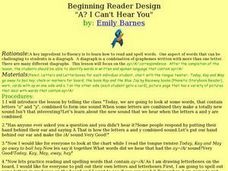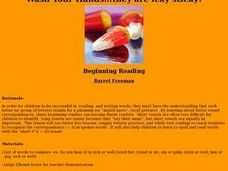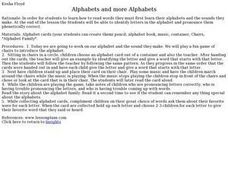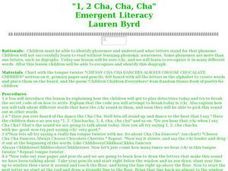Curated OER
Say aahhh....said the doctor
Students recognize the short vowel O in written and spoken language. Through matching activities, they discriminate the short vowel /o/ from other vowel sounds. Students associate the phoneme with its letter representation and identify...
Curated OER
Shhh
Students identify the digraph /sh/ in written and spoken language. Students practice the production of the /sh/ sound through storiesand tongue twisters. They identify the initial and final placement of the new digraph /sh/ using a...
Curated OER
Ike's Ice Cream is Icy
Students recognize the short vowel i in written and spoken language. Through matching and listening activities, they discriminate the short vowel /i/ from other phonemes. Students associate the phoneme with its letter representation and...
Curated OER
Can You Hear the Sound?
Students recognize the short vowel e in spoken language. Through matching activities, they discriminate the short vowel /e/ from other short vowel phonemes. Students associate the phoneme with its letter representation and identify the...
Curated OER
Aaah, I'm hungry
First graders recognize the short vowel a in written and spoken language. Through matching activities, they discriminate the short vowel /a/ from other phonemes. Students associate the phoneme with its letter representation and spell...
Curated OER
/o/... I can't stop yawning!
Students investigate the phoneme, a meaningful representation, and the letter symbol for /o/ (short o). This lesson plan helps students recognize the /o/ in spoken words and begin to spell words with the assistance of letter boxes....
Curated OER
Iiicky, Stiicky, I
First graders recognize the short vowel i in written and spoken language. Through listening and matching activities, they discriminate the vowel sound /i/ from other phonemes. Students identify the phoneme and letter in psuedo words they...
Curated OER
Shhhhhh the Baby is Sleeping
First graders identify the digraph /sh/ in written and spoken language. Students practice the production of the /sh/ sound through word practice and riddles. They identify the initial and final placement of the new digraph /sh/ using a...
Curated OER
When is Ed Fed?
Students recognize the short vowel "E" in written and spoken language. Through listening and writing activities, they discriminate the short vowel /e/ from other vowel sounds. Students associate the phoneme with its letter representation...
Curated OER
A? I Can't Hear You
Students identify the digraphs in written and spoken language. After a brief discussion on the combinations of letters that comprise digraphs, students practice a tongue twister containing the digraph ay. They identify the digraph in...
Curated OER
Droopy Dog says....
Students study the /d/ sound by making the sound and determining where their tongue is when the make it. They repeat a tongue twister while emphasizing the /d/ sounds. Next, they identify the sound in words as the teacher uses a puppet...
Curated OER
Baby Sally is Upset Again!
Pupils, assessing how to read and write, join together grapheme's and the phonemes that make up words. They practice recognizing in oral and written form the vowel /a/. The book, "Matt and Rags," is introduced to the students in this...
Curated OER
The Squeaky Creaky Elevator
Young scholars engage in an emergent literacy lesson in order to help develop the skills of letter recognition and corresponding sound of the phoneme. This is done with the use of a tongue twister using the phoneme of the letter "e".
Curated OER
"Poppy P"
Students engage in a lesson of emerging literacy that focuses on phonemic awareness. The phoneme for the letter "p" is chosen for the lesson and students must acquire the skill of letter recognition also.
Curated OER
Wash Your Hands...they are icky sticky!
Learners engage in an emergent literacy lesson that focuses on phonemic awareness and they practice corresponding the letter "i" to its long or short sound. This type of recognition has been found to be essential to reading development.
Curated OER
Alphabets And More Alphabets
Students identify and phonetically pronounce the letters in the alphabet. They participate in a letter identification game, and play musical letters. Students then listen to the book "Alphabet Family" and discuss their favorite words...
Curated OER
"1, 2 Cha, Cha, Cha"
Students complete a variety of activities related to the /ch/ sound. As a class they recite a tongue twister, then trace and write the letters ch. Students then listen to a list of words and identify the words containing /ch/, and...
Curated OER
Under the Umbrella
Students study the letter-sound recognition of the /u/ by reciting a tongue twister, writing the letter in both upper and lower case, and identify words with the letter 'u' in them. Next, they sing a song, and listen to a story while...
Curated OER
Long ee or ea
Students practice spelling words with the long e sounds using ee or ea. In this ee or ea lesson plan, students complete words using the ee or ea pattern, identify rhyming words, and write a rhyming poem using ee words. Using word and...
Curated OER
Where is the Sound of - g ?
In this word and letter recognition worksheet, students examine 7 pictures and words. Students identify whether they hear the g sound at the beginning or end of each of the words.
Curated OER
There Was An Old Lady...
First graders read "There Was An Old Lady Who Swallowed a Fly" and use Kid Pix to identify characters from the story. In this character identification lesson, 1st graders first hear several versions of the classic tale, and then locate...
Curated OER
Letter/Word Recognition Activity Sheet
In this letter recognition worksheet, learners name the given letters and practice their sounds. Students also read the five given sentences and say six sight words.
Curated OER
Gulp!
Students identify the grapheme and phoneme for G. They practice writing the letter G and through listening activities, discriminate the phoneme /g/. They associate the phoneme /g/ with its letter representation and identify it in various...
Curated OER
Mmm, Mmm, Mmm
Learners identify the grapheme and phoneme for M. They practice writing the letter M and through listening activities, discriminate the phoneme /m/. They associate the phoneme /m/ with its letter representation and identify it in various...























